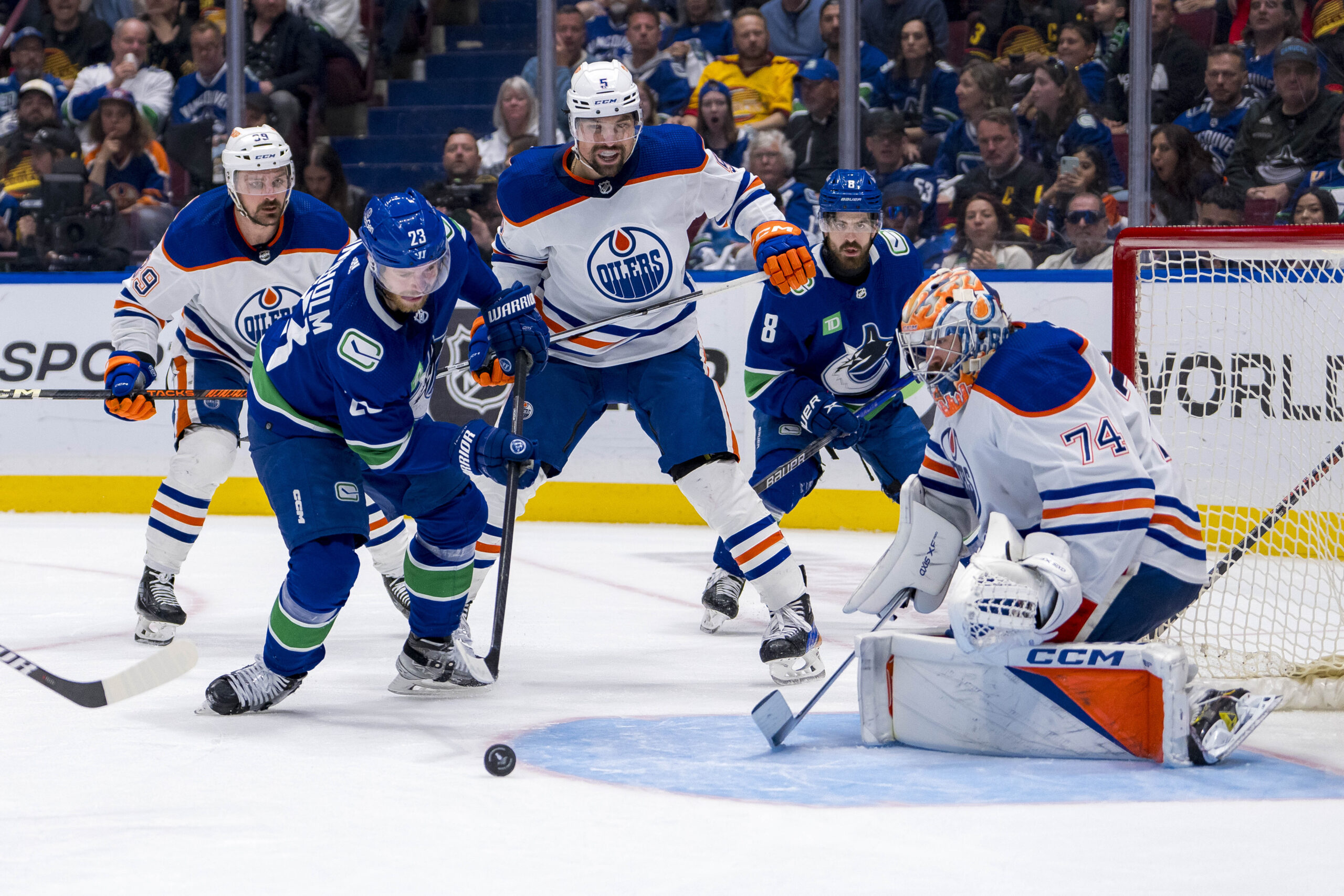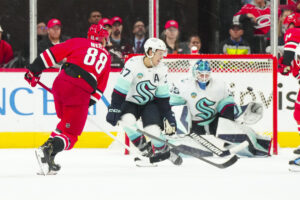The Vancouver Canucks can sign Elias Lindholm at any time – and any other team can on July 1st. He might not be the fan favourite, but his impact is greater than any hit thrown by Nikita Zadorov.
Canucks Must Sign Lindholm to Keep Strength
The point of a hockey team in the NHL isn’t to be as good as last season. Even teams that win the Stanley Cup know they will lose players through free agency or retirement. Teams that hold all their players have no guarantees those players will be as good when they’re a year older. As much as in any sport, luck plays a big role in hockey and that is hard to catch twice.
For Vancouver to succeed, they need to take what successes they had in 2023-24 and build on them. With a dozen free agents looking to get paid – or at least continue their careers – focus is essential. There were happy discoveries along the way, but those need to be incorporated into the future team, not held out as exemplars.
Short version? They have to make concrete moves to satisfy vague terms. A great start would be getting Lindhom’s name to paper before they look at the market. Here’s why.
Lindy Hopped
Lindholm was rumoured to be on the block well before the trade deadline. He was in the final year of a bargain contract signed with the Calgary Flames and had indicated he wanted to move on. Jim Rutherford and Patrik Allvin, being who they are, moved quickly to bring Lindholm to Vancouver.
The intention was never to just have Lindholm as a rental. The veteran was brought in to join the team as another centre, pushing talent downwards. None of Lindholm, Elias Pettersson, or J.T. Miller are classic third-line centres, but they could be used that way during 5-on-5 play. Lindholm, like Miller and Pettersson, can work both special teams as well, and he’s just as well known for his defence.
The move started with a bang – two goals in his first Canucks game – but production wasn’t as high as expected afterwards. He scored just five goals and nine points in 22 games. His defensive game was decent, but not Selke-nominee level. And that certainly wasn’t the scoring expected of him. There was even talk of possibly moving him to another team before the deadline.
When Lindholm was finally put on the shelf it surprised no one. Doubts about his contribution remained until he came back with four games remaining in the regular season. He managed three points in these games but really showed his form once the playoffs began.
Lindholm was everywhere for Vancouver, playing both special teams and registering five goals and ten points in 13 games. He played against the snipers on the Edmonton Oilers and the grinders with the Nashville Predators. Getting production in any role he was handed is an impressive feat, and if the Canucks do re-sign him, that’s why.
The Bullseye Is In The Centre
Vancouver has two very capable, top-line centres right now. Miller and Pettersson have proven themselves, even if some fans complain that Pettersson’s “only” a point-per-game player. In another era, the thinking would have been to keep them as just that and get grinders behind them. Classically, the build is two scoring lines, a defensive line, and the muckers who aren’t active liabilities.
There can – and should – be another way to think about it. Last season had the surprising run of Conor Garland and Dakota Joshua with either Teddy Blueger or Pius Suter between them. Joshua might not be back, though, and frankly, neither might Garland. Having a third line that was also a scoring threat salvaged long stretches of the Canucks season when the rest of the team faltered.
Even more tellingly, in the playoffs Suter was moved up beside Miller and Brock Boeser. The line worked because Suter is a good player, but that’s not really who you want to rely on for scoring. Lindholm took Suter’s place and produced well with Garland and Joshua, while the team tried to find a combination for Pettersson.
In much the same way the year started with Phillip Di Giuseppe beside Miller and Boeser, the lines worked, but not all the parts were equal. The Canucks need more top-end skill players than they do ones who round out the bottom six. Additions to the team should put pressure downwards, not up. Centres are much harder to find than wingers, and in a pinch can move to the outside. Wingers can’t suddenly move to centre.
You Know You Want To
“Be specific” that is.
https://x.com/ThomasDrance/status/1793709257772421245
By all accounts, the team really likes Lindholm. That’s not just team representatives in management but the players as well. According to Canucks insiders like Thomas Drance and Rick Dhaliwal, players are asking Lindholm what it would take to convince him to stay. Unfortunately for them, it could be far more than the Canucks are willing to pay.
Limdholm’s expiring deal was for six years and averaged below $5 million per season. In those 444 regular season games, he scored 154 goals and 369 points; was a Frank J. Selke Award finalist; and had a 42-goal, 82-point season. The only other time Vancouver has had a player with such a potent combination of offence and defence was Ryan Kesler. That’s great company to be in, but it doesn’t come cheap.
Age is a factor in whether the Canucks can – or should – sign Lindholm. He’s 29 years old, and this is his last kick as a substantial contract. He’s not going to reach 40 goals again in his career, and on the Canucks will likely have the role of the match-up centre. Opportunities are fewer when you’re the shadow as different priorities take precedence. It’s a fine balance.
On many other teams, Lindholm would be counted on to score and get paid like it. While the Canucks are the only team who can offer an eight-year deal, their actual “Cup window” is shorter than that. They have almost $24 million in cap space for next season but also need to sign at least three defencemen and a handful of forwards. Can they afford to pay enough to make Lindholm happy?
Canucks Must Sign Lindholm
Maybe you missed it at the beginning, but the team should make Lindholm a priority. That Stanley Cup window we mentioned is realistically three years long – IF the team can improve quickly enough. Money needs to be saved in some places, certainly, but top-end skill isn’t one of them.
The Flames moved on from Lindholm when they couldn’t agree on a long-term extension, with rumours putting it in the 8 x $9 million range. He lost a lot of money turning that down and having an indifferent finish to the year. His playoff run rebuilt some of that value, and the Canucks are ready to make a serious push for the Stanley Cup.
A shorter deal would make sense from Vancouver’s standpoint, and Lindholm might not find a similar offer elsewhere. The Boston Bruins might open the vault and ignore the calendar, and if they do the Canucks can’t match it. But a higher-priced, three-year deal could be just what the fan base ordered, fitting right in with their best chance at the championship.
Main Photo: Bob Frid-USA TODAY Sports






